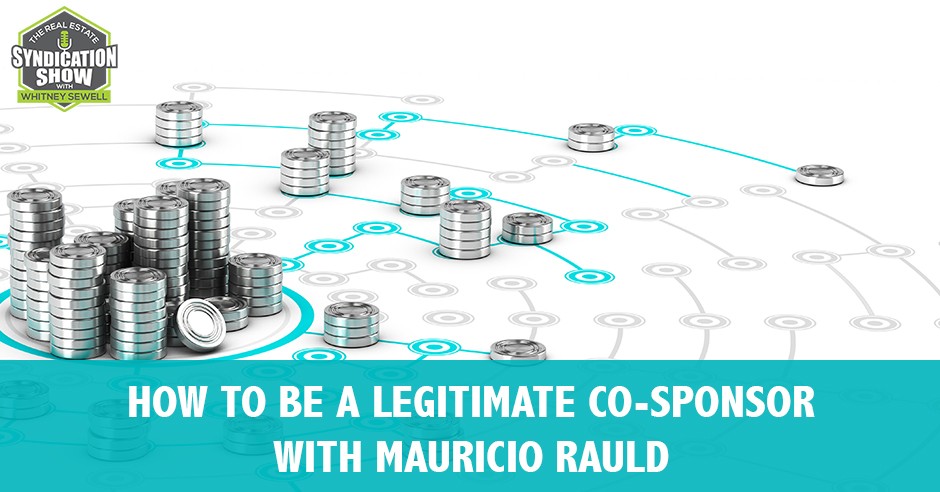
Listen to the podcast here:
When trying to raise money in real estate, it is always necessary to consider the legalities behind the transaction, otherwise, your effort would all go down the drain. Mauricio Rauld, the Founder and CEO of Premier Law Group, teaches the do’s and don’ts of helping others raise money in real estate transactions. He also gets into the common ways – both legal and illegal – people get compensation from syndication, emphasizing the communication you need to have on the front end with your securities attorney to make sure you’re not breaking the rules.
—
Watch the episode here:
How To Be A Legitimate Co-Sponsor with Mauricio Rauld
Our guest is Mauricio Rauld. Thanks for being on the show again, Mauricio.
Thanks for having me back. I appreciate it.
I’m always honored to have on the show somebody at your level of expertise and experience to share with the readers and me. For the readers, I’m sure you’ve heard of him before. You’ve probably seen him on social media. I hope you have connected in some way. You’ve probably heard him on the show WS 194. You should go back there and learn more about him and his background. He’s the Founder and CEO of Premier Law Group, an internationally recognized securities firm that spends 100% of their practice on syndication for real estate investors. He regularly travels around the country, speaking to real estate investors and entrepreneurs, educating them about how the syndication legal piece fits into the overall syndication puzzle. He shared the stage with the likes of Robert Kiyosaki, Kim McElroy, Peter Schiff, Brad Sumrok and The Real Estate Guys. Mauricio, thank you again. Give the readers a little update about what your focus is now, if anything has changed or what’s going on. Let’s dive right into this topic that everybody is dying to know about.
I’m still plugging along and doing the same things that I’ve been doing full-time or exclusively for the past few years, which is syndication. 100% of my practice is representing real estate investors who are raising capital to go do bigger and better deals. I make sure that they stay out of jail and avoid being cellmates with Bernie Madoff as I liked to joke. I’m talking a little bit these days about opportunity zones but always in that context. A lot of my clients reached out to me and are interested in that topic. It’s part of the syndication process. I live in the syndication world, specifically all the exemptions. If you’d like, I can do a quick overview so that people understand what we talked about in that episode.
That would be great.
I will do that because you will see how our topic fits into that overall structure. We’re going to be talking about the do’s and don’ts of helping others to raise money. Syndicators are selling securities, which is why the SEC is involved. A lot of people say, “I’m buying a piece of property. Why are the securities laws involved?” The reason is any time you’re taking money from investors where there’s an expectation of a return and you’re the one that’s generating the profits, in other words, your investors are passive and you’re active, you’re dealing with the security and therefore need to comply with securities laws.
There are only three things we think about or consider when we are selling securities. Number one is we must register that security with the SEC. Number two is we must find an exemption to that registration. Number three is it’s illegal. We rarely, if ever, want to do a full-blown registration because it takes a ton of time and money. It will take one to two and a half years to get that process through the SEC. If you’re in a contract to buy a building, who has a year or two to wait for the SEC to approve your deal? It’s not realistic. I’ve had clients where it’s cost them seven figures. Exemptions is where we spend most of our time. We talked about the most common exemptions. That’s where you hear 506(b), 506(c) or Reg A plus. All those types of exemptions are so that we don’t have to register with the SEC. If you’re not complying with the securities laws and you’re not registered or not filing an exemption, then you are conducting an illegal offering.
The topic, which is helping other syndicators raise money in exchange for compensation, is going to fall under breaking one of these exemption rules and becoming an illegal offering. It is a very important topic. Along with the social media rules that everybody is breaking these days, paying others illegally for raising money is probably one of the biggest mistakes people are making out there. I’m glad we’re talking about it now.

I appreciate you elaborating on what we covered in the last show. I highly encourage people to go back to that and then come back to this one. It is so common. I hear it in every conference I go to. A lot of people I know in the industry and all over social media are about raising capital and partnering with other people. We want to know that we’re doing it legally and how to do it. It’s a great way for people to get started in the industry. We want to make sure we’re not getting started to find a jumpsuit. We want to make sure we’re doing it legally and we’re presenting ourselves and the entire team as professional as possible. You’re going to help us understand that better. Get us started in knowing that we’re doing it legally. People want to raise capital and get started. You talked to so many people, maybe about some common mistakes.
The first thing you have to recognize is that anytime you’re receiving compensation for helping others to raise money, you’re most likely acting as a broker-dealer. The rule is you cannot pay anybody a commission or transaction-based compensation unless that person is an SEC licensed broker-dealer. That’s like you can’t practice medicine without a medical license. You can’t practice law without a license. You can’t be giving advice or receiving compensation for referring people unless you’re a broker-dealer. Let me start with the common ways I see people doing it that is an absolute no-no. We will talk about the proper ways to do it so you’re doing it legally. The first one is people just do it. People are out there just flat out making introductions and recommendations and referring people to sponsors. The sponsors are cutting them a check. Whether that’s officially in writing or it’s a handshake or what have you, that’s being done.
The problem on the receiving end, whoever is receiving the compensation, is they’re practicing without a license. The problem from the syndicator is that they’re not disclosing that because it’s an illegal payment so people don’t disclose it. You’re doing the illegal offering because you’re not giving them the full set of disclosures. When you’re paying a referral fee, that can have a material effect on somebody investing like, “Are you referring it to me because you’re getting the compensation or are you referring to me because you do think it’s a good deal?” That’s the number one obvious mistake. I see people doing it. They don’t even think about whether do you need to be licensed or what are the exemptions or what have you. That’s number one.
If I met somebody downtown and we were talking about investing in real estate but I wasn’t a syndicator and I said, “You should go meet my buddy that’s closing on this apartment complex.” Is that illegal?
[bctt tweet=”You cannot pay anybody a commission or transaction-based compensation unless that person is an SEC licensed broker dealer.” username=””]
That would be fine as long as you’re not getting compensated. Referrals are a great way to meet new people. That’s one of the ways you can actually not have a pre-existing substantive relationship and still not be afoul of the marketing rules because you didn’t market or advertise that person. It was referred to you by a current investor or whoever. That’s a referral. That’s fine. It’s the getting compensated part that is the problem. I don’t want to get too much into the finder’s world because a lot of people are trying to get around it that way too. Maybe that should be our number two point. Maybe the way you said it was okay because you were making the introduction. The traditional nice way of doing a finder is like, “If you have a list of ten people that you can give to me, I’m going to pay you $10,000 with the list of ten people. I reach out to those people.” It’s like a finder. You haven’t made any representations and any recommendations to that effect. I don’t trust anyone to be able to just say, “Here’s Whitney’s telephone number. He has a deal. You should call him.” There’s always going to be, “He’s got a great deal. You should talk to him.” There’s always some additional stuff in there. The finder distinction is very dangerous. Also, another thing to consider is that the finders are stuck at the state level but remember this is all federal.
I appreciate you saying too that the referring was okay because as long as you’re not compensated and you’re not advertising, that person didn’t come to you because of your advertisement. They were referred.
A lot of people think that the only way that you’re not going to be considered advertising or soliciting is if you have some pre-existing substantive relationship. That’s not true. 80% to 95% of the time, that’s the easiest way to do it. There are other ways to not be considered advertising and referral is a great one. You can’t get compensated for that. The minute you start getting compensated, now you’re an unlicensed broker. The next one that’s realistically common one is everybody likes to put the side agreements together. “We will call it a marketing agreement. We will call it a consulting agreement or an independent contract agreement.” There are two issues with that. The first one is whatever you call that arrangement, it doesn’t matter. The SEC is going to look straight through that document and look at the underlying facts. They’re going to see what exactly you did.
If you are claiming, “I’m paying this guy a marketing fee,” it’s going to be your burden. If you get caught or you’re in a situation where you’re sitting across a regulator, it’s going to be your burden to prove all of these marketing things you did. If you’re claiming you’re doing A, B, C, D and E, your burden is to prove it. It’s the same with the consulting agreement, which is difficult to do. If you’re a consultant, you’re doing some consulting work, meeting this person in person or on the phone. You’re going to have to provide records, notes of your meetings and minutes of meetings. It’s going to be your burden to show that you did that work and that the compensation was commensurate with that work. If you’re suddenly getting $1 million check or whatever for doing a little consulting work, that might not make sense. You’ve got to be careful. On the consulting agreement, it doesn’t matter what you call it. The burden is going to be on you to show that. That’s another way that you want to avoid doing that.

You said there were two issues. It doesn’t matter whatever you call it. The SEC will see right through it. It’s going to be your burden to prove it.
It can be done. I used to endorse this a bit. I’m backing off a little bit. That is the fund of funds, which can be legal. This is a good hybrid one. In theory, you could raise money into your own fund and syndication. If you raise $1 million into your syndication, you turn around and invest that $1 million into somebody else’s deal. You get compensated at your level. You take an acquisition fee and management fee. You split it 80/20, however you want to do it. You can probably negotiate with the company that you’re investing in, maybe a little bit of preferential treatment because you’re coming in with a huge million-dollar investment. Maybe you’re getting a little bit better-preferred return. That way, you can take that compensation, that extra amount of money and pay yourself. The challenge is when you do that, you’ve got to remember that you’re no longer raising money and investing in real estate. Even investing in an LLC that owns real estate that essentially is a pass-through right to investing in real estate. You are now investing in a security. You’re investing in somebody else’s. It’s not stock, it’s somebody else’s membership LLC. It’s like you’re buying Apple stock or Microsoft stock or what have you. Now you’re giving advice on securities as opposed to real estate.
The question that always pops up in my mind is, “Do you now need to be a registered investment advisor in order to do that?” It’s not a full-blown broker-dealer but a registered investment advisor. The challenge I’ve always had is that is a state by state issue. It’s not a federal issue. The only time it becomes an issue at the federal level is if you’ve gone over a $100 million in assets under management. Below that, it’s a state issue. What state do you live in? It depends on that. Some states require you to register as a registered investment advisor, which isn’t the end of the world. It does require you to take a series of exams. There are some compliance issues that you’ve got to stick through. Unless you’re doing that for a living or you’re going to do a lot of it, it’s not the greatest thing.
There are other states like California, which is surprising to me, that hasn’t exemptions to that. You don’t have to register as a registered investment advisor. You do have some compliance, including the dreaded audited financials. There might be a cost involved. I don’t think the actual work is a big deal. You can outsource that, but there’s a cost involved. You can do the fund-to-fund. It’s not do-it-yourself. All these issues that you probably hadn’t even thought about come into play. When you’re doing the fund-to-fund, even though it’s a legal way to do it, there are some strings attached to that. If there are any other ways that you’ve seen people that you think is illegal, I’m happy to comment on them. Those are the three or four ways that I see most people doing it in terms of trying to raise money for others that’s illegal.
I’m doing a consulting agreement, but I’m also on the GP side. Why is that not okay?
Let’s say you’re sitting across the regulator. The regulator is saying, “I see that Whitney is a 5% or 10% GP in your deal. What did Whitney do to earn that 5% or 10%?” Your answer cannot be, “He helped me raise money.” It has to be something else. When you’re coming in as a GP, you have to be doing real work. You can’t be just getting a percentage of the deal in order to get a percentage of the GP. What are the ways that you can legally do it? There are two or two and a half. We already talked a little bit about the fund-to-funds, which you can do. You’ve got to check with your state regulator or states securities attorneys, which I can help you do that as well. To make sure that you’re doing that in compliance, whether you’re registering as a registered investment advisor or whatever compliance that state requires, the next way would be to become a broker-dealer. That’s not realistic. The last time I looked at it many years ago for The Real Estate Guys, Robert and Russ, it was a six-month process. It was expensive. It has a bunch of exams and compliance. It’s cheaper to buy one. For $500,000 or something like that, you can go by a broker-dealer firm. That’s probably the quickest and easiest way to do it. There are still a ton of compliance so it’s probably not realistic, but I wanted to throw it out there.
The main way to do it is to bring them in as a legitimate co-sponsor. When I say legitimate, I do not mean, “Come in and go help us raise money. We will give you 5% or 10%,” or the worst one, which is, “Depending on how much money you raise, we will give you a percentage of the deal.” That’s truly a transaction-based compensation, which is the hallmark of being an advisor or broker-dealer. They have to be legitimate, which means they’ve got all the liability. They’re co-sponsors. If the deal goes south, they’ve got fiduciary responsibilities. They’re going to go south with them. They’re part of the deal. They’ve got to do real work, whether it’s helping with the underwriting or talking to the lawyers, CPAs or investor relations or putting the business plan together. All that stuff that everybody else is doing, they have to do that as well. If it ever gets to that point where somebody is challenging you and saying, “You are in 10% here. You didn’t put any cash into this deal. What did you do?” You cannot say, “He helped me raise money.” You’ve got to list all of the other items. They have to make sense.
If you’re doing investor relations where you’re spending a couple of hours a quarter and you’re getting 25% to 30% of the deal, it’s a hard sell. It got to be commensurate with the amount of work you’re doing. It doesn’t have to be equal, but it has to be somewhat commensurate with the amount of work you’re doing. That’s the main way that I recommend doing it in these days. The fund-to-fund is something you may want to look into. I would stay far away from finder and the marketing agreements. There are a couple of clients that legitimately do marketing. That’s what they’re getting compensation and it’s a flat fee. It’s like, “You pay me $15,000 and I will put together the business plan. I will put together the one sheet that we call. We will take over your social media and marketing. It’s 506(c) so we will market in social media. We will blast it out to our group of people.” There are legitimate ways. It doesn’t matter whether they’re raising money or not. That’s one of the questions you need to ask yourself. When you pay someone, are you willing to pay someone $10,000 to $20,000 or give somebody a 10% interest in the GP, whether they raise $1 or $100 million or $0?

As an experienced syndicator, you’re bringing on a partner who can have the benefit as well of raising capital. They’re going to be doing other things. You’re going to look at their track record a lot better then too. Hopefully, they can bring a lot of value in raising the capital. You’re going to have to say, “This is what you’re going to be paid. You better bring more value by raising capital.” Whether they do or don’t, this is what they’re getting pay.
Here’s the other risk you have. This has happened to a couple of clients that I’m working with that weren’t doing it while I was working on their particular syndication. Because you can’t put it in writing, you can’t put a contract together and say, “For every $100,000 you bring in, I’m going to give you 1% or whatever,” it’s just a handshake agreement. What happens when the relationship goes south, which has happened in this case? You’re not quite done with the entire phrase, but something’s happened as fall out on the partners. They want to get rid of the partner, but the partner is saying, “I’m supposed to be 20% or 30% of the company.” They’re like, “You were supposed to raise the money and you didn’t raise any money.” Now there’s a huge dispute. What do you do? You’ve got to be careful.
That’s why we have somebody like you in our team.
Be careful about that. The whole syndication on the legal side is not a do-it-yourself project anyway. It’s one of my pet peeves. Everybody thinks, a lot of times, the syndication attorneys are people who just put together documents, “I need somebody to put the PPM together or put this together.” That’s such a fraction of what we do. We’re there as advisors. At least in my case, I’m underwriting. I’m looking at your deal, your business planning and pulling out all the information. That’s one of the things I’m pulling out. Are you paying a commission to a legitimate broker-dealer? No. Are you paying commissions? When you can do this, “I wanted to do this.” You can’t do that. That’s all part of that communication that you have to have on the frontend with your securities attorney so that you don’t fall afoul of these rules.
[bctt tweet=”The whole syndication on the legal side is not a do-it-yourself project.” username=””]
It’s not just about putting docs together, it’s about finding out all the risks in your deals. Number one is you can figure out what to put in the docs. Number two is you can advise a client whether they’re doing something right or wrong, including the social media stuff. I started doing social media reviews for my clients. I do website reviews too because that’s another issue with people. They have websites out there. They’re doing 506(c)s that are in violation. I do the same thing with social media. I can’t keep up with social media on a daily basis. I do a snapshot review. It’s become such a big issue that I take a more proactive approach. A lot of times, they won’t tell me what’s going on and what they’re doing on social media or other website.
That’s a great service that I hadn’t even thought of. From your standpoint, it’s you looking at my website or my social media and giving me some feedback, “You should take this down or this is okay.” I did have somebody go to my website, an attorney. It was my signature on my email. It says something about, “Invest with us.” At that time, I’d never even thought about it until he brought it to my attention. He said, “I clicked on it.” I’d love to have your opinion. It took him to a scheduling app to schedule a call with me. It doesn’t show him offerings, deals or anything. It’s to schedule a call. He didn’t think that was a massive problem.
I do a video recording of your website. I look at your website. Depending on how terrible or good it is, it may be a two to five-minute video. I go through your whole thing and I point out different things on the page and different tabs. It’s the same thing with the social media review. It’s okay for you to put information about your company. It’s okay for you to invite people to call you to find out more about your information. If you saw one of my videos, which I posted on Facebook on social media, and it’s one of my more popular ones, there’s a process that you can take. Once you accept or capture people through your website, there’s a process that you can take them through to take them from a complete stranger all the way through to having a pre-existing substance of relationships so that you can offer them a future deal.
There are a specific process and guidelines that the SEC gives us. That’s step one. Just because you captured that person’s information and you have a call with them that’s great, you can’t put them in your deal unless it’s a 506(c). If you’re doing a 506(b) that prohibits advertising or soliciting, that’s going to be considered advertising if you put them on the deal. If you walk them through these six steps that you must take in order to get to know them well and establishing a substantive relationship, you can put them on the next deal, not the current deal and not run afoul the marketing rules. I’m finalizing my mind seven-part video series that’s on the social media, the do’s and don’ts. I’ve seen so many people messing that one up. There are so many people on social media doing things that they should not be doing. It’s such a huge thing. I decided to do a little video series on it. If anyone’s interested, I’m happy to share that with you.

I can’t wait to see that. Hopefully, we will do another show about social media. We will be able to tell people where to find that. I’d love to do that as well. Bringing them on legitimately, it’s illegal unless they have a legitimate work to do. It can’t be based on how much they raise. I wanted to go one step a little further into that because it’s common in the industry to bring somebody on that can raise a lot of capital. That’s a big value that they’re bringing. Let’s say we’re going to pay them a certain amount. They will have other jobs in the business plan. They also have five to ten people under them that are raising capital through them for that opportunity.
That’s fine. The fact that you give them shares and you’re counting a lot of shares, but a limited liability, but shares in your company in the form of GP, it is still compensation. When you give somebody cash or shares, that’s all compensation. As long as you’re not compensating for them to raise money, you’re fine. If somebody comes in an LLC, if you’re bringing in a corporation or a company and anybody in that company, and assuming that the company is a legitimate co-sponsor, they have employees and team members. Those people can go out there along with everybody else who’s a co-sponsor. They become agents of the co-sponsors. It’s part of the co-sponsorship. I don’t have a problem with that at all. The main company that you brought in as a co-sponsor needs to be a legitimate co-sponsor. They’re doing all this work in exchange for all this work, bringing their expertise and helping you underwrite, do due diligence, put the business plan together, in investor relations and all that stuff. They’re going to get compensated. The way they do that is through a percentage of the company. It’s not for raising money.
Mauricio, is there anything else on this subject specifically that you’d like to let the readers know?
I think we beat it to death.
I appreciate your time. Tell the readers how you like to give back.
I’m becoming a little more active on Facebook. If you track me down on Facebook, you will see some of the videos. I started a YouTube channel in the Mauricio Rauld. I would appreciate some views over there. If you’re interested in that social media video series, it’s coming out. If you want to shoot me an email, it’s Team@PremierLawGroup.net. I will make sure to send that to you when it’s available. I’m super fancy in all this great stuff. Just a simple email and I will get you on the list and send that information out to you.
Is there any other way they should know how to get in touch with you?
That’s the main one. You can always go to my website, PremierLawGroup.net. That’s probably the easiest way to get ahold of me. I’m always happy to talk to your audience. If anybody wants to hop on a call, I’m happy to do a complimentary call with them as well. That email will get to me. I’m happy to talk to them in person or happy to send them the collateral that I have.
Thank you for providing so much value to the audience. It’s such a big topic. I hear it at every conference. I hear it numerous times. People talk to me every week, numerous times about raising capital and getting started. We want to make sure we’re doing it legally. I appreciate you. We hammered it and we need to. We’ve got to go in as depth as we can. I appreciate that a lot. I also appreciate the audience being with us. I hope you will be back. I hope you are going on the Facebook group, The Real Estate Syndication Show. I will be sure to be active in there so we can all learn from experts like Mauricio and grow our businesses together legally. We will talk to each of you soon.
Important Links:
- WS 194 – previous episode with Mauricio Rauld
- Premier Law Group
- The Real Estate Guys
- Mauricio Rauld on YouTube
- Team@PremierLawGroup.net
- PremierLawGroup.net
- The Real Estate Syndication Show on Facebook
About Mauricio Rauld
 Mauricio is the founder and CEO of Premier Law Group, a premier boutique securities law firm. As a nationally recognized expert on private placements, Mauricio works with elite entrepreneurs who seek to increase and protect their wealth through syndications. Mauricio specializes in Reg D exempt offerings and educates investors from around the world on how to navigate the complex world of securities laws. Known for taking complex matters and making them simple to understand, Mauricio is sometimes, jokingly, referred to as one of the few lawyers who actually speaks English.
Mauricio is the founder and CEO of Premier Law Group, a premier boutique securities law firm. As a nationally recognized expert on private placements, Mauricio works with elite entrepreneurs who seek to increase and protect their wealth through syndications. Mauricio specializes in Reg D exempt offerings and educates investors from around the world on how to navigate the complex world of securities laws. Known for taking complex matters and making them simple to understand, Mauricio is sometimes, jokingly, referred to as one of the few lawyers who actually speaks English.
Regularly traveling around the U.S. as a noted speaker to business groups, Mauricio is also as regular contributor to The Real Estate Guys™ Radio show (consistently one of the most downloaded podcast on real estate investing) and is Robert Helms’ personal advisor.
Twice a year, Mauricio joins Ken McElroy (master syndicator with close to 10,000 apartment units totaling $500m) and The Real Estate Guys™ to teach a few hundred students, the ‘Secrets of Successful Syndication’ a comprehensive course on raising capital for entrepreneurs.
Once a year, Mauricio shares the stage with the likes of Robert Kiyosaki (Rich Dad, Poor Dad, best selling financial author of all times), Tom Hopkins, Simon Black, Peter Schiff, Chris Martenson, and others as a faculty member of the ‘Summit at Sea’, a week-long high-level summit with elite, like-minded real estate entrepreneurs.
Mauricio previously served as a member of the elite group of “EVG Advisors” who along with the Elevation Group,™ are committed wholeheartedly to provide real education often overlooked by traditional educators.
With almost 20 years of experience, Mauricio has previously been selected as a “Southern California Rising Star” by the Southern California Super Lawyers Magazine, recognizing him as one of the top 2.5% up-and-coming lawyers in Southern California. A graduate of The University of California at Berkeley, Mauricio obtained his Juris Doctorate degree from Loyola Law School in Los Angeles, where he was a member of the Scott Moot Court Honors Board.
Love the show? Subscribe, rate, review, and share!
Join the Real Estate Syndication Show Community:



